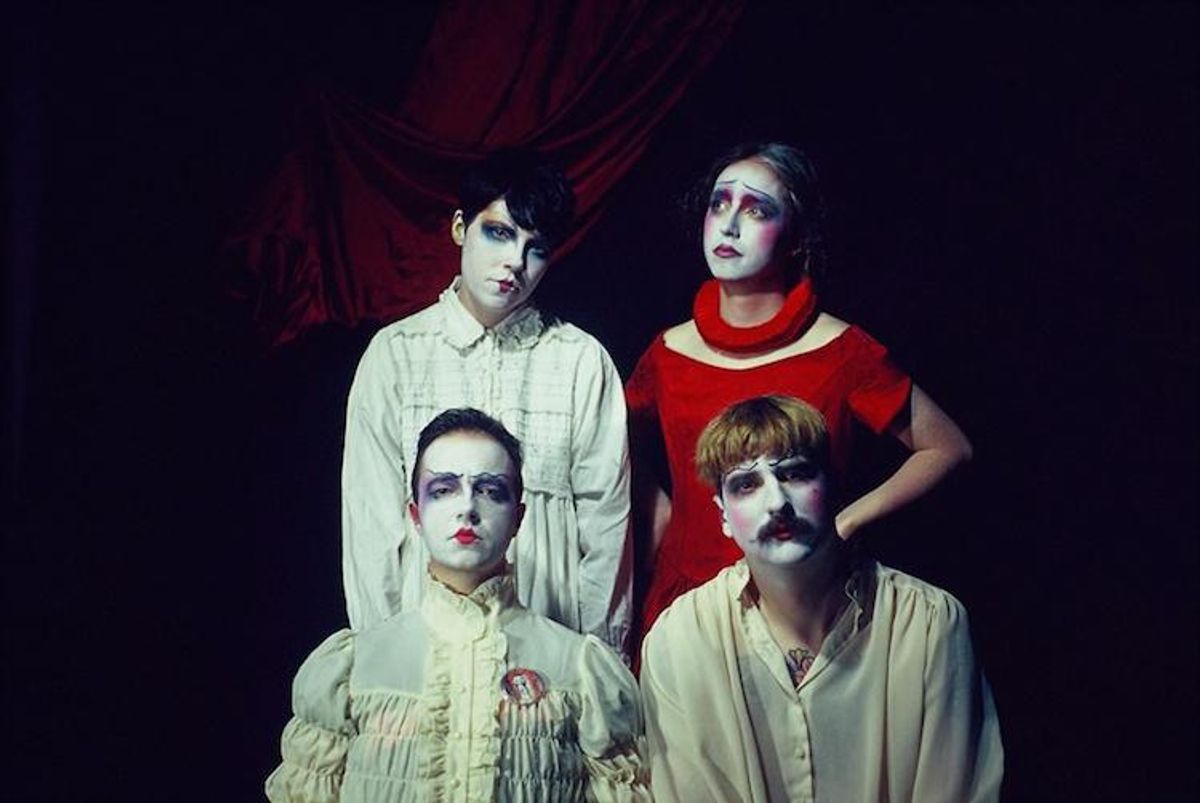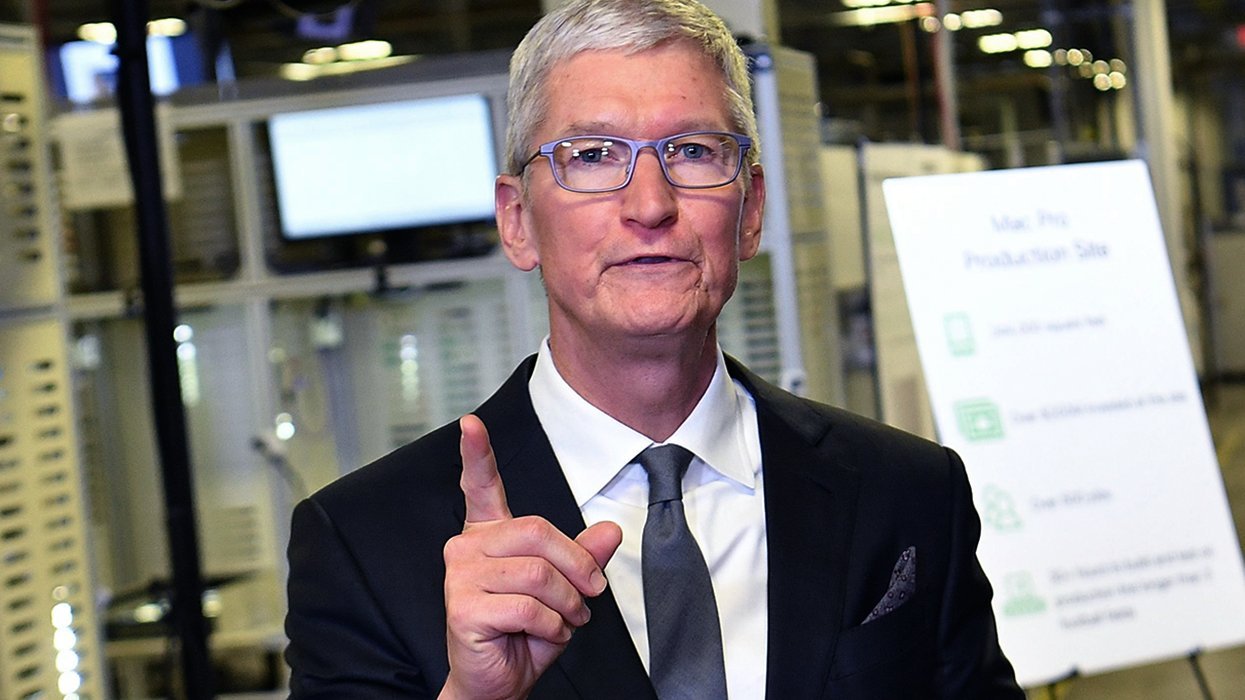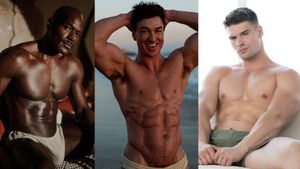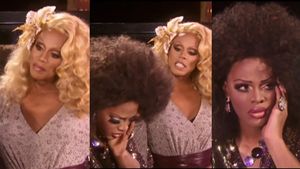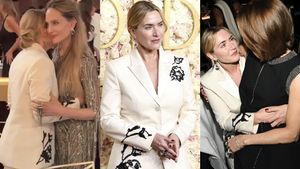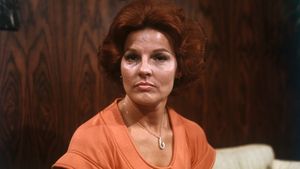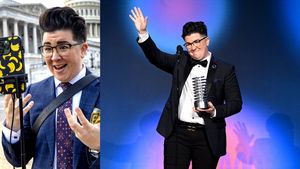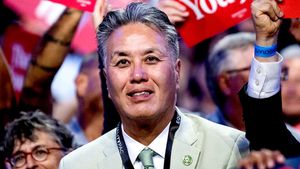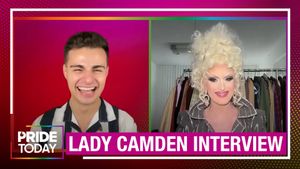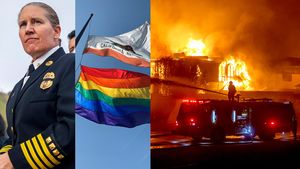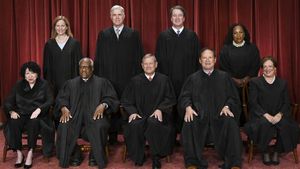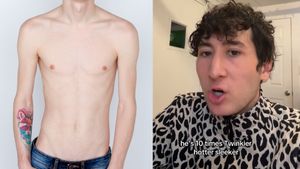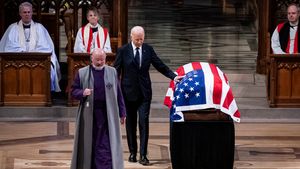When it comes to gender and sexuality in music, it's easy to become transfixed by labels. There are the "queer pop stars" and "lesbian punk singers" or "trans punk band," in the case of Scottish pop punk quartet The Spook School. They don't really mind, though. As tiresome as it may seem to have their music wrapped up in their identity, it's their identity that has given them so much creative material for their music. Plus, as lead vocalist Nye Todd explained, "I think it probably makes it easier for other trans and queer folks to find our music. We're not only our identities, but we are proud of them."
It's this upbeat optimism that guides them through a music catalogue that has culminated in the release of their latest album, Could It Be Different? The short answer, if we're talking in a metaphysical sense about the band itself, is yes, it could and is different, because they can't help it. Made up of brothers Nye and Adam Todd, AC Cory, and Niall McCamley, the four rockers have become a loud and important voice in the sparse transgender music scene and their catalogue of songs reads like a syllabus for a gender studies class in the best way possible. From songs about sexual assault ("Still Alive") to gender dysphoria ("Body"), they've become the go-to politically minded rock stars their fans need in this troubling time.
As they celebrate their new album, we caught up with them to talk about transgender bathroom laws, David Bowie, and the pleasure of listening to "Come Undone" by Robbie Williams.
OUT: You've been adamant about venues requiring gender neutral bathrooms at your shows. As a group from the UK, how have you reacted to seeing the United States grapple with this issue?
Nye Todd: I think what's most frustrating about a lot of the conversation you see in the press--particularly in the US--about gender neutral bathrooms or just trans folks using gendered bathrooms is how much misinformation and demonization dominates the conversation. There's all this talk of 'men dressing up as women to prey on women in bathrooms' which isn't at all backed up as a plausible concern, certainly not in comparison to the numbers of trans folks that face discrimination and/or violence when just trying to use toilet facilities.
As well as just being inaccurate, it's frustrating on another level because it makes it hard to help people who are worried understand that gender neutral bathrooms and/or trans people using gendered bathrooms are nothing to be scared of. Really, the thing that I personally want is just for everyone to feel comfortable and to not live in fear of something as essential as using public bathrooms. Luckily, we have the ability to allow this at our gigs, and that's not much, but it's a small way that we can try and create a welcoming space for anyone that wants to come to our shows.
How has gender and sexual identity shaped your new album?
Nye: In some ways, this album is less blatantly about gender and sexual identity than our previous album Try to Be Hopeful, as most of the songs are about specific relationships and experiences in our lives rather than larger themes like masculinity or gender identity. But, on the other hand, as a bunch of queer and trans folks writing about our experiences, those experiences are definitely shaped by our identities. We can never escape from that--and we wouldn't want to.
One of the songs I wrote the lyrics for, "I Hope She Loves You," is a song about seeing an ex-partner getting married and thinking back on that relationship. But it's also about me, as a trans person, looking back on a relationship that happened before my transition and the unique weirdness of that situation.
Then there's "Body," which is mostly about feeling a combination of pride and disgust at your own body. That's an issue that isn't specifically about being trans but for me, it's very related to that. Our understanding of our own gender and sexual identities shape us, and because of that, it can't help but shape the music we produce.
Within and outside the confines of the band, how has music shaped your lives?
Nye: Music has certainly had a massive impact on my life and identity. As strange as it might seem, given that I grew up in the 90s and not the 70s, it was actually my love of David Bowie that first allowed me to start thinking about my own gender identity. Of course, there are many amazing artists that are actually openly queer, transgender or non-binary, and thankfully these days they are somewhat more prominent in mainstream media as something other than the butt of a joke. When I was a teen, though, I just knew that there was something powerful in how Bowie played with his gender presentation and sexuality. There's a lot of critique over how authentic Bowie was in that regard, and I understand that, but I'm certainly still thankful that such a proudly weird, camp and fluidly presenting person gained such fame. His existence and his music helped me understand that it was okay not to be normal and that there was a power and a beauty in being weird--I really needed that.
What's your guilty pleasure song and/or album?
Nye: I think I'm too earnest a person to have guilty pleasures. Some other people might suggest that it should be "Waterline" by Jedward or "Come Undone" by Robbie Williams but I genuinely love both of those songs and have no guilt whatsoever. "Come Undone" in particular makes me feel so many emotions, it's one of my all-time favorite songs.
Your song "Still Alive" was about surviving sexual assault. Have you noticed that song taking on a new meaning in the wake of the Me Too movement?
Nye: Yes, and no. I think initially, when I was introducing the song, I was unsure how to phase things, because we do live in a society where often only the most extreme and clear cut set of events is characterized as "actually" rape or sexual assault. Seeing the conversation move on in recent weeks from Weinstein to the allegations against Aziz Ansari, which more closely reflect the kind of experiences I've had, has been both good to see and difficult at times. It seems like there's a general conversation about sex and the treatment of sexual partners that's developing that's going past a straightforward "rape is wrong, anything not meeting that bar is okay" outlook to a more nuanced view that sex is only good if both participants are respected, consenting and enjoying themselves.
Looking forward into 2018, how do you see Brexit and the political landscape impacting your lives and your music?
Niall McCamley: It's hard to know--It certainly isn't going to make our lives easier. What it will actually mean is still such a giant unknown. It's certainly anxiety-inducing and seems to be such a regressive way to approach the world, and Europe more specifically. It's certainly going to make travelling harder in the future. Well, at least for the rest of the band. Being Irish, I am the proud owner of a European Union approved passport. I'll wave at the rest of the band whilst they wait in the massive queues at border control. [Laughs]
For our music we only seem to be able to write about how we feel and what we're experiencing. "Bad Year" on the current album came from the Brexit vote. Hopefully something nice will happen soon and we can write a happier tune.
The world can be a pretty depressing place lately. What's your coping mechanism or escape for bringing some positivity to your life?
Niall: I recently got a mullet and dyed it blonde. It still feels quite nice. I don't know if I have a successful coping mechanism because I constantly feel freaked out but I do love a long and aimless walk into the wilderness. There's a strange niceness in getting lost and disappearing sometimes.
Do you feel you've been pigeonholed into being "the trans band" or do you mind this label often being associated with your music?
Nye: I don't mind--I think it probably makes it easier for other trans and queer folks to find our music and I think a lot of it might speak more strongly to people that share the kind of experiences that we write about. We're not only our identities, but we are proud of them, and happy to be identified with them. I think if we were worried about not being identified as a trans or queer band we wouldn't write music that's so much wrapped up in our identities, but really even if we wanted to do that--I'd have no idea how to!
